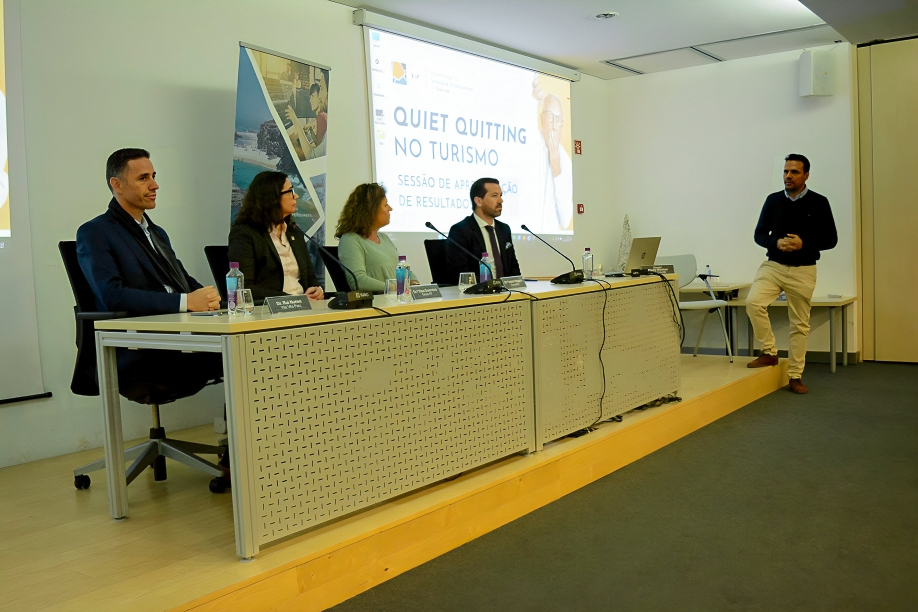«The risk of silent dismissal in tourism in the Algarve is greater for workers between 25 and 34 years old and semi-skilled staff». The conclusions are from a study presented by researchers from the KIPT Innovation and Tourism Association, a Collaborative Laboratory on the sector in the NERA auditorium in Loulé.
«Silent dismissal is characterized by a generalized feeling of dissatisfaction, resulting in a lack of commitment to work and a lack of intention to go beyond minimum obligations», explains KIPT.
According to this collaborative laboratory, the study sought to frame and explain the impact of this phenomenon on talent retention in hospitality and tourism in the Algarve.
From a sample of 1223 professionals, it was found that, at the basis of satisfaction, the organizational climate arises, that is, the importance of collegial decision-making processes, the acceptance of innovative ideas and recognition.
The results also revealed the need to study forms of career progression to mitigate this effect and that workers need recurring recognition and rewards, to be heard, and still want to have friends and a good work climate.
The presentation of this first study by the KIPT Innovation and Tourism Association was made by researcher Antónia Correia, president of the board, and included a debate in which human resources (HR) professionals from Vila Vita, AP Hotéis, Vila Petra, Zoomarine and the president of the Association of Hotels and Tourist Enterprises of the Algarve.
According to KIPT, everyone «highlighted the relevance and importance of the study and confirmed that they had felt, in recent years, silent dismissal in the age groups present in the results».
Also unanimous was the «need to refocus on the passion for hospitality» and to work on «worker satisfaction as we do with the customer».
The need for «the entire organization to be involved in motivating workers» and implementing the notion that «each middle manager is an HR», understanding the motivations and expectations of workers and not treating everyone equally, were other ideas defended, as HR departments “do not have the resources to cover all employees”.
The false notion of low wages paid in the sector, the lack of housing and an effective public transport network in the region, as well as high tax pressure and the demonization of tourism professions, were other points highlighted in the debate and which everyone assumed had impact on attracting and retaining tourism professionals in the Algarve.
The results of the study also pointed out «the organizational climate as a determinant for the feeling of belonging and talent retention, being achieved with the involvement of employees, achievable objectives, a fair and ethical performance evaluation and the stimulation of interpersonal relationships at work ».
According to the study, employees over 50 years of age are resigned and are not very willing to change jobs, largely due to the feeling of belonging they have for the company where they work.
Employees with less professional experience and foreign nationality “present significant levels of satisfaction, especially in relation to training opportunities and career progression prospects in the organization.
The appreciation of work is highlighted as a positive experience for the majority of workers, with special emphasis on the age groups between 18 and 24 and over 50 years old. These groups perceive completing work tasks as an enriching experience.
KIPT is a private non-profit association, recognized by the Foundation for Science and Technology (FCT) and the National Innovation Agency (ANI) as the first and only Collaborative Laboratory in the area of tourism.
It is jointly led by the University of Algarve / Center for Research, Development and Innovation in Tourism (CiTUR); ATA- Algarve Tourism Association, University of Évora (CEFAGE and CIDHEUS); Training and Cultural Animation Cooperative, CRL / Universidade Lusófona; Leiria Polytechnic Institute; Polytechnic Institute of Bragança; Uniaudax – Center for Entrepreneurship and Innovation / University Institute of Lisbon (ISCTE) and ADVANCE/ISEG/University of Lisbon



















Comments